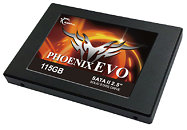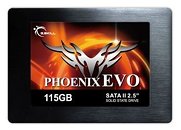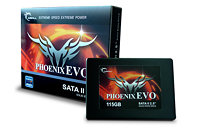Friday, April 1st 2011

G.Skill Intros New Phoenix EVO SATA 3 Gb/s SSD with 20 nm-class NAND Flash
G.Skill International Co. Ltd., manufacturer of extreme performance memory and solid-state storage with solid quality, today announces its new Phoenix EVO SSD, utilizing the performance leading controller SandForce SF-1222 and high quality 2xnm NAND flash chips. The Phoenix EVO drive contains 115GB with rated speed of read/write 280/270 MB/sec, and will be available via G.Skill authorized distribution partners in early April.
Keeping pace with the flash manufacturers' transition from 3xnm to 2xnm, G.Skill has utilized 2xnm flash chips for its award winning SSD, Phoenix family. To ensure the best performance and reliability during the transition, G.Skill has teamed up closely with SandForce and has run G.Skill Phoenix EVO through a wide range of rigorous tests with the latest firmware. All Phoenix EVO drives only use strictly selected original flash chips from key suppliers to guarantee the top reliability and stability.Although 2xnm based Phoenix EVO requires more over-provisioning space and less performance comparing with G.Skill current 3xnm based Phoenix Pro drive, it certainly is a great choice for cost effectiveness and delivers a positive impact on affordability for the customer. On the other hand, all G.Skill Phoenix Pro drives still use only 3xnm flash ICs to guarantee the consistency of rated performance and capacity.
"The performance benchmark of G.Skill Phoenix EVO is listed on G.Skill official website. With the information transparency, consumers can easily choose the right product according to their desire and budget" said Wales Tsai, the G.Skill SSD product manager.
G.Skill Phoenix EVO SSD comes with 3 years warranty and the G.Skill technical team is always ready to provide consumers with complete technical support via online forums, telephone and email.
Keeping pace with the flash manufacturers' transition from 3xnm to 2xnm, G.Skill has utilized 2xnm flash chips for its award winning SSD, Phoenix family. To ensure the best performance and reliability during the transition, G.Skill has teamed up closely with SandForce and has run G.Skill Phoenix EVO through a wide range of rigorous tests with the latest firmware. All Phoenix EVO drives only use strictly selected original flash chips from key suppliers to guarantee the top reliability and stability.Although 2xnm based Phoenix EVO requires more over-provisioning space and less performance comparing with G.Skill current 3xnm based Phoenix Pro drive, it certainly is a great choice for cost effectiveness and delivers a positive impact on affordability for the customer. On the other hand, all G.Skill Phoenix Pro drives still use only 3xnm flash ICs to guarantee the consistency of rated performance and capacity.
"The performance benchmark of G.Skill Phoenix EVO is listed on G.Skill official website. With the information transparency, consumers can easily choose the right product according to their desire and budget" said Wales Tsai, the G.Skill SSD product manager.
G.Skill Phoenix EVO SSD comes with 3 years warranty and the G.Skill technical team is always ready to provide consumers with complete technical support via online forums, telephone and email.



11 Comments on G.Skill Intros New Phoenix EVO SATA 3 Gb/s SSD with 20 nm-class NAND Flash